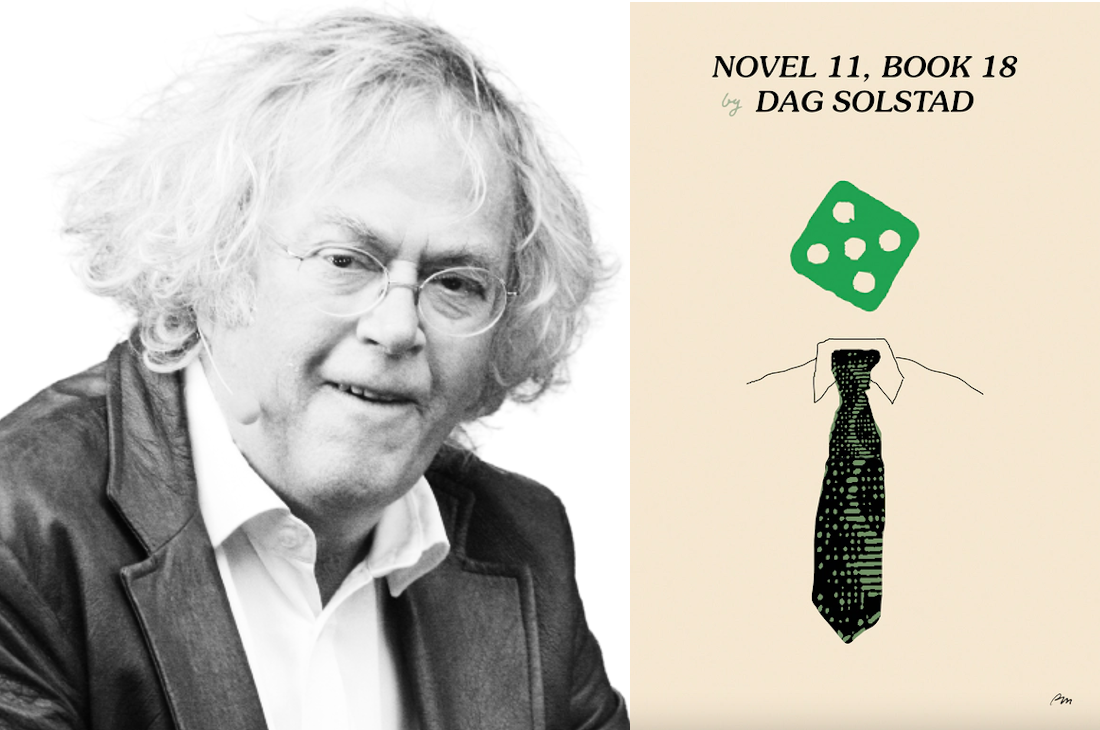

Translated from the Norwegian by Sverre Lyngstad.
This was how Bjørn Hansen’s existence had shaped up. This was his life. At Kongsberg. With Turid Lammers, this woman he had to live with because he feared he would otherwise regret everything. Turid Lammers was the life and soul of the circle. Her beauty and sophistication dazzled everyone. Why didn’t they get married?Because Bjørn Hansen assumed that Turid Lammers would consider such a question coming from him to be infra dig. Hadn’t he left everything and come to Kongsberg, to her, to live with her without any guarantees? To the others in the circle, Bjørn Hansen’s presence in the Lammers villa was completely natural. He was a man who had been offered the chance to leave everything, and to do so in the company of Turid Lammers. When Bjørn Hansen saw Turid Lammers shining so brightly in the surroundings of the Kongsberg Theatre Society, he too thought that way. But he had also caught sight of something else about her, namely, that she was all the time under the influence of something that had long ago come to an end, which did not exist. Turid Lammers was not going anywhere, there was no direction to her life, except to remain where she was and sparkle. All this enthusiasm, all these plans, all this energy finding an outlet every hour of the day, in the classroom, in the florist’s, in the Society, in her life with Bjørn Hansen – all this had no meaning beyond itself.
Was he playing a dangerous game? In any case, he awoke one night to find her side of the bed empty. It might have been about a year after he arrived in Kongsberg. He had become accustomed to his new life. He saw that she wasn’t there. He looked at the time. Four. She had gone out in the evening, to a rehearsal. He couldn’t sleep, just lay there twisting and turning. When she came it was half-past five. Where had she been? Where she had been? Was she not a free human being? Bjørn Hansen could not bring himself to enter into a discussion of human freedom on such premises and went to sleep. When he got up two hours later, she sat at the breakfast table, as usual. She revealed that she had been talking with Jan at his place, his digs, all night. Bjørn Hansen nodded. Jan was the strikingly beautiful railway employee who played Sigismund in Summer in Tyrol, which they were rehearsing; he had a scene with Turid Lammers. ‘I see.’ – ‘I see, I see, is that anything to get jealous about?’ – ‘I’m not jealous!’ – ‘You’re not jealous?’ Turid Lammers laughed. Aloud, scorn-fully. She kept at it until Bjørn Hansen admitted that he had been jealous, that he was bothered by her staying with Jan.
And that had been true. He had actually been jealous. He had known that Jan was going to the same rehearsal as her, and when he woke up at four o’clock and she was not sleeping beside him, it occurred to him that she was perhaps sleeping somewhere else, with an Adonis from the railway, this homo ludens who had suddenly awakened her innermost desire. He had felt forsaken, and so afraid of losing her. Turid was pleased with his admissions. She maintained that it was unworthy of him to be jealous and that, in fact, it was also an insult to her. Nothing had happened, as he ought to have known. She had been having a deep conversation with Jan. The hours had flown by, because Jan had been telling her about his expectations of life, and she had been listening. She had been listening to a young man who still believed that life was really something that should be lived somewhere wholly different from here, in places where he wished he lived, and she had been so taken by the sudden openness of this man – who was so attractive and such a dreamer – that she had completely lost track of the time. If she had known it was so late and that Bjørn had woken up and felt tormented by such thoughts, she would have come home long ago. For some reason or other, Bjørn believed her, and after-wards he always believed her assurances that there had been nothing going on.
For it happened that Turid Lammers began to come home in the early morning hours in much the same way, after a rehearsal which she (but not he) had attended, and it also happened that she very reluctantly broke away from a rehearsal they had both attended, or after a party, of which there were many in the circle around the Society, to return home with him because he wanted to leave (but not she), because she was all sparkle sitting in her stage outfit with some man, a genuine and self-important homo ludens who now, inspired by her presence, put on a performance in which he pushed himself to the limit, with a self-taught text conceived on the spur of the moment, which now collapsed, of course, since she had to get up and go home with her partner, because the Treasury opened at nine in the morning and for some incomprehensible reason everything would grind to a halt if the treasurer hadn’t had enough sleep, the number of hours determined arbitrarily by the treasurer himself. Incomprehensible. Kongsberg Secondary School, after all, continued to function even if Miss Lammers went straight to her teacher’s desk from a party at the Society, a fact sufficiently proven by the diplomas awarded to her pupils. Well, even the florist’s shop of the Lammers sisters opened punctually at nine in the morning, and the saleswomen would, as a matter of fact, all be there, and the customers would not stay away even if the youngest Lammers sister had danced through the night, until the crack of dawn, instead of having been suddenly inter-rupted and dragged home by a jealous partner. On such occasions Bjørn Hansen walked beside her, as stiff as a poker. But he believed her assurances that his fear of losing her was com-pletely groundless.
Why, then, did he get jealous? Why did he walk home from a party as stiff as a poker beside her?Why did he sometimes tremble with suppressed fury once the members of the merry Theatre Society had left the Lammers villa after a party, and scream out his real message to her, his feeling that now he had lost her, forever? It happened time and again. Turid Lammers as a dazzling focal point. The circle lost in admiration around her. Among them her partner, Bjørn Hansen. That Turid was at the centre of things did not mean that she sat in the middle, quite the contrary, because part of Turid Lammers’s charm was also her modesty. Not only did she leave the principal roles to others, she also left the geometrical midpoint to others; she herself felt happiest at the small tables on the periphery, where she was first surrounded by both men and women, then by three or, alternatively, two men, until finally she was alone with one man, who immediately launched into his self-taught script as if for the first time – a teacher educated at Eik Teachers College who was now performing the scintillating script of how he had been cast under a spell in the mountainous Kongsberg area, because at long last he had acquired the sort of audience every amateur actor desires for his monologue, ever ready to be delivered: two starry eyes, waiting lips, a woman with French gestures, at once distant and approachable, and he did not notice that this secret monologue, to be privately performed for her alone, at a discreet side table, turned into a crowd scene in which he, as the lone walk-on, represented them all, on their knees in front of the admired Turid Lammers. Wasn’t everyone now casting sidelong glances at Bjørn Hansen? No, as the years went by, only new members shot sidelong glances his way, at first. But not later. For everyone learned that Turid Lammers was faithful to her Bjørn, which didn’t lessen their admiration for her, at the same time as she let herself be unrestrainedly admired, even conquered, by a chosen one who sat spellbound at her table, although even he knew that he would in the end get up and go home, alone. (Or, if not, at any rate sleep alone, for Turid Lammers always left the chosen one’s house or flat or rented room without allowing herself to be kissed passion-ately, but at most gently and sweetly, as she sometimes admitted openly to Bjørn, although the whole night might pass before that happened.) And Bjørn Hansen knew this. Which was why he could maintain his mask. But no sooner had the Society’s members left the house than he blew his top, allowing all his jealousy to emerge. Turid Lammers thought so anyway. In reality it was nothing but a pretence on his part. He did it for her sake.
For he did not dare entertain the thought that Turid might display all of her feminine charm vis-à-vis the evening’s chosen member of the Society without her partner becoming beside himself with jealousy. He could not bear the thought of causing her so much pain. Because what would happen then? Well, after Jan has been courting her for three hours, he gets up and leaves, together with the other guests. She is alone. Her husband is reading a novel in an adjacent room and now he comes to her and asks in a friendly voice, ‘Would you like a cup of tea?’ Then he might as well have packed his belongings and moved. Out of the Lammers villa. Away from Kongsberg. What bound them to one another would have been lost.
Dag Solstad is one of Norway’s leading contemporary authors. His work has consistently won critical acclaim and he is the only author to have received the Norwegian Literary Critics’ Award three times. All three of his novels available in English have been longlisted for the Independent Foreign Fiction Prize: Shyness and Dignity was shortlisted in 2007 and Novel 11, Book 18 and Professor Andersen’s Night were longlisted in 2009 and 2012.
Sverre Lyngstad (1922–2011) was a scholar and translator, perhaps best known for translating and popularizing the works of Knut Hamsun.
This excerpt from NOVEL 11, BOOK 18 was published by permission of New Directions Publishing. Copyright © 2001 by Dag Solstad. Copyright © 2008 by Sverre Lyngstad




